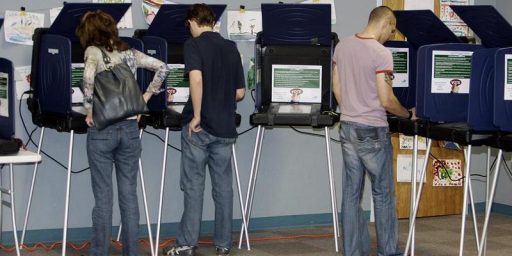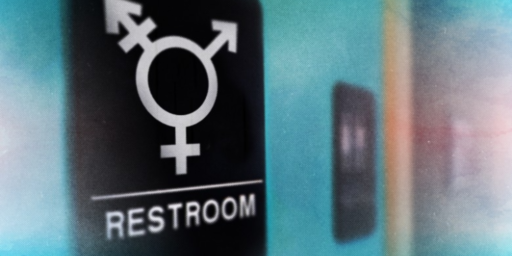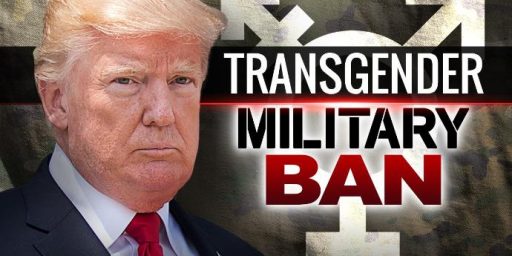78,000 Transgender Americans Could Be Denied Voting Rights in 2018
A new study claims voter ID laws may disenfranchise the demographic, potentially swinging several Congressional races.

Metro Weekly* (“Study: 78,000 transgender Americans could be prevented from voting in 2018“):
A new study estimates that approximately 78,000 transgender people in eight crucial states will be eligible to vote in the upcoming 2018 elections, but will be unable to do so, due to those states’ excessively strict voter ID laws.
The study, from the Williams Institute, an LGBTQ think tank at the University of California-Los Angeles law school, estimates that there are 137,000 transgender people who have transitioned in the states of Indiana Wisconsin, Kansas, Virginia, Tennessee, Mississippi, Alabama, and Georgia. But an estimated 57% of them, or 78,000, will likely be turned away from voting because they lack proper documentation or identification that accurately reflects their gender identity.
In all eight states, poll workers require voters to provide a government-issued photo ID, such as a driver’s license, U.S. passport, or military ID, in order to cast a ballot. Poll workers then must decide whether that identification accurately identifies the person in front of them and matches the information listed on the voter rolls. These laws can be especially problematic for transgender people, who often face multiple barriers to changing gender markers on identification documents.
“Transgender people who have transitioned often face substantial challenges to obtaining accurate identification,” Jody Herman, the study’s lead author and a public policy scholar at the Williams Institute, said in a statement. “Requirements for updating the name and gender on official IDs that could be used for voting vary widely by state and federal agency, and the process can be difficult and expensive.”
According to data from the 2015 U.S. Transgender Survey, transgender citizens who have transitioned were significantly more likely than others to not have proper IDs reflecting their gender identity if they were people of color, aged 18 to 24, students, low-income, or if they had disabilities.
The percentage of transgender people who do not have up-to-date identification documents in those eight states goes as high as 70% in Alabama, where people must obtain both a court order and provide proof that they have undergone gender confirmation surgery in order to change the gender markers on photo IDs, and as low as 40% in Virginia, where applicants must either obtain a court order certifying a name change or provide documentation from a medical provider certifying their gender identity.
Turning away transgender people from the polls could impact crucial races this fall, thereby affecting which party controls Congress. There are six competitive Senate races in Indiana, Wisconsin, Virginia, Tennessee, and Mississippi, where both Senate seats are up for re-election. There are also several competitive House races in Wisconsin, Virginia, Kansas, and Georgia.
“Strict voter ID laws could deny thousands of citizens who would otherwise be eligible to vote an opportunity to participate in the democratic process and have their voices heard at the ballot box,” Herman concluded. “Lawmakers, election officials and government agencies must work to ensure that transgender people have equal access to vote.”
Two caveats up front:
First and foremost, to the extent transgender citizens face additional hurdles to voting, it’s highly problematic. That proposition should be far less controversial than the right of people to choose which public restroom to use (which I also support), given that voting is a fundamental right and there are no messy cultural taboos at stake.
Second, given that there’s no evidence of significant voter fraud of the sort that could be stopped with ID cards while there’s significant evidence that obtaining ID cards poses an obstacle for already-disadvantaged groups, I oppose laws, such as those in my own state of Virginia, requiring photo ID as a condition of voting, notwithstanding that I personally have multiple government-issued photo IDs.
That said, I’m confused by this story. Specifically, while I can understand—although I admittedly had not previously considered—how individuals undergoing gender transition would face barriers at the polls, it’s not obvious to me how the photo ID requirement adds to said barriers.
I’ve voted dozens of times, in numerous states and localities, over the past 34 years. Regardless of whether I’ve been asked to show an ID, I’ve been required to state my name so that it could be checked against the rolls and annotated. Because I have a conventional name that has long been associated with males and present as male, this has been a straightforward process. There’s no reason for a poll worker to doubt that I’m, in fact, “James Joyner.”
Having read the above story, it now occurs to me that things would not be so easy for a transgender individual or, say, Johnny Cash/Shel Silverstein’s proverbial boy named “Sue.” If someone presenting as male went to a poll worker and said, “I’m Sue Silverstein and I’m here to vote,” they might well receive skeptical treatment. In that case, though, if “Sue” was the individual’s legal name and they still looked more-or-less like the picture on their ID card, the card would ease rather than hamper the situation.
Likewise, if someone born male and named “John Cash” was now presenting as “Joanna Cash” but had not legally changed their name showed up to vote, they’d likely be ruled ineligible since “Joanna Cash” would not be on the rolls. If they explained that their legal name was “John Cash,” they’d probably be greeted with skepticism. That would have to be not only embarrassing and frustrating but likely exacerbate their dysphoria. That’s sad. But it’s not obvious how the voter ID requirement makes it worse. If anything, it would make it easier to prove that they are the “John Cash” on the rolls.
Even aside from the transgender community, our naming conventions are problematic in a modern society. Since few of us live in villages where everyone knows us, the fact that dozens if not hundreds of people may have the same name creates challenges with things like government watch lists. The fact that women (and an increasing number of men) still tend to change their names after marriage—and sometimes again after divorce—creates all manner of headaches. I either lack the imagination or simply haven’t thought about it long enough to come up with an adequate solution.
With regard to transgender individuals, we almost certainly need to make it easier to change one’s sex on government documents. Again, I simply haven’t studied the issue enough to have particular suggestions for how to implement that; one presumes some states have figured it out and others can look to them for best practices. Changing one’s name is easier but still more complicated than it should be given modern information systems. There simply has to be a way to make these things less burdensome for people already going through significant personal struggles.
___________________
*UPDATE: While it doesn’t change my analysis, the fact that Metro Weekly is unabashedly aimed at “Washington, DC’s gay and lesbian community” and markets itself as “the largest and longest-running LGBTQ publication and website in the region” ought make us take the stark impact claims in the story’s lead, from which I drew my article subhead, with some skepticism.






Two points to consider, from different sides of the issue:
First of all, the process to change one’s name is relatively easy but the process of changing legal gender is complicated in some states. In Virginia it’s a relatively easy process that someone can generally pull off without the need for an attorney. I’m not sure, though, how easy it is for someone who is transgender to change their gender legally. I would imagine it is more difficult in some states than others. Additionally, as you note the barrier becomes a little more difficult for someone who is in the middle of the transition process.
Second, I’m not sure why this isn’t something that can easily be dealt with by simply voting absentee.
@Doug Mataconis: Sure. My late wife changed her name without all that much difficulty or the need for an attorney. But it was still a giant pain in the butt, in that she had to change her name literally everywhere, down to the local drug stores. It should really be a one-stop shopping experience, with an official name change automatically changing everything else tied to one’s Social Security number.
But, again, I’m not sure that’s the issue here. If “John Cash” legally changes her name to “Sue Cash” and presents as a woman, having an ID card saying “Sue Cash” would actually make voting easier if she still looked to the eye more like a “John.”
@Doug Mataconis:
Surprisingly, this actually varies from state to state. We lived in NYS when the policy about plane tickets having to match ID was taking effect. My wife didn’t take my last name but her first name was spelled in an “interesting” way on her birth certificate, a way that caused mispronunciation. She has used the more traditional spelling since grade school but her passport had the original. Although it is routine for someone to change their last name it turns out that in NYS it is a huge ordeal to change your first name. As in, don’t do it without a lawyer, and expect it to cost a lot of money and take months. Before she got too far into the process we moved to CT so she did it there. Much easier and no lawyer needed, but “easier” is still a relative term. There was a non trivial fee and she had to take a day off work appear before a judge.
Could.
Is there any evidence that transgender people actually have been turned away at the polls? Or is this just another We Hate Voter ID Laws rant disguised as a scientific study?
On the other side of the coin tho, without voter ID laws, what’s to prevent me from showing up in the morning to cast my vote, then coming back in the evening to vote as my dead mother? Are you going to question my gender?
IDK… Maybe Trump could establish a commission or something to look into all these voting concerns.
Side note: Illinois’ firearm owners id really is racist.
@James Joyner:
I was referring more to the whole “changing legal gender” side of the occasion. I know that it’s a fairly straightforward process in some states, such as California, but not exactly easy in others. This would make things difficult for a transgender person seeking to update their voting registration or any of the other number of issues that someone in that situation would face. And the fact that it still remains complicated for a married woman to change her name once she’s legally married suggests that the process is probably more difficult for transgender Americans, especially in more conservative states.
@TM01:
As James Joyner has noted, there is simply no evidence of the kind of in-person voter fraud that Voter ID is capable of addressing. With that in mind, the necessity for such laws seems doubtful to say the least and, as I have said in the past, if such laws are going to be passed then states must be required to make it as easy as possible for someone who is legally eligible to vote to obtain such identification and to make it as inexpensive as possible. As numerous court cases have found, that is far from the case in many Republican-controlled states and there has been evidece presented in some states that the main purpose for such laws has been to make it more difficult for poor and minority voters to vote.
@MarkedMan:
Yea I know it varies from state-to-state. It’s relatively easy in Virginia, but as James noted a something as simple as a married woman seeking to legally change her name is far more complicated and time-consuming than it needs to be.
I find the argument for a single national I.D. card/device pretty convincing on several levels (losing a few points on my liberal score, I guess). This is one. A biometric (say, fingerprints) could be imbedded and solve all sorts of difficulties.
This would only be compatible with American values if the U.S. government took responsibility for maintaining the system, issuing and verifying the cards and such.
Like the O.P. – I hadn’t had to consider the difficulties changing one’s name (to say nothing of one’s entire social identity) can cause. I learn a lot here. Thanks, everyone.
The issue is real and anybody being denied the right to vote is serious. “No taxation without representation” and all that.
That said, I do wonder how much impact this will have on the 2018 election. The combined populations of the listed states is almost 47 million. There is probably some concentrating of transgender individuals in certain congressional districts but 78,000 out of 47 million suggests the sub head above stating that the issue could swing some congressional elections is a little bit hyperbolic. Far more likely this issue will impact the local races which can have greater impacts on individuals.
Also the article states
I can’t speak to the WI race but the VA race is not competitive and I find it hard to believe TN or MS are either, IN I am only slightly less doubtful of it’s competitiveness.
@JohnMcC: While I have many conservative and libertarian tendencies, I share the instinct that a common national ID card makes sense for a variety of reasons.
@OzarkHillbilly: Yes, I’ve added an update to the OP caveating the source of the claims.
@OzarkHillbilly:
There are two race in Mississippi. Roger Whittaker will easily win re-election in his race, but the race to replace Thad Cochran, who retired in April, could end up being competitive depending on who the GOP nominee is. A new poll shows Mike Espy, who served as a Congressman from MS and Secretary of Agriculture under Bill Clinton, ahead of Chris McDaniel, who was the candidate who tried to take out Cochran a few years back, although he is trailing Cindy Hyde-Smith, the Republican named to replace Cochran by the state’s Governor.
Another attempt to protect voter fraud by claiming doing anything will disenfranchise somebody.
@Doug Mataconis: Thanx, I don’t follow MS politics much.
@ScienceABC123: Another attempt to perpetuate abject stupidity with out any facts to back it up.
In other words, the law is working as intended?
If Republicans were interested in actual voter fraud, they would notice that every time organized voter fraud occurs, it’s done through mail in and absentee ballots. I’ve yet to hear a single individual claiming concern about “voter fraud” so much as acknowledge that fact, much less discuss ways to prevent that sort of fraud.
I’m largely a skeptic of the Voter ID problem. The process of getting an ID can be made annoying and unnecessarily difficult –it’s a bureaucratic process, after all– but I don’t think it’s impossible or even that onerous.
That being said, the complications outlined above for trans people are concerning.
Of course, I’m not surprised this issue is affecting “the states of Indiana, Wisconsin, Kansas, Virginia, Tennessee, Mississippi, Alabama, and Georgia.” Ah, the fruits of political abandonment.
@James Pearce:
Maybe it can be made easy, if those in charge want it to be. But the states pushing these laws clearly have no such intent and have made no effort to ensure that those lacking an ID card can get one. In some cases they have, to the contrary, gone out of their way to make it challenging by limiting the list of acceptable IDS. In any case, it can be quite difficult especially for low income individuals to get an ID.
@OzarkHillbilly:
I don’t either, although I did write quite a bit about that bizarre Cochran-McDaniel primary fight.
The Special Election for Cochran’s seat will be interesting because, rather than party primaries followed by an election, Mississippi will be using a procedure similar to Louisiana’s. There will be a non-partisan “Jungle Primary” on November 6th and, assuming that nobody gets above 50%, a runoff three weeks later. If the current polling holds up that runoff will be between Mike Espy, the top Democrat in the race, and Hyde-Smith. If that’s the case, then Hyde-Smith will likely easily win the runoff. If McDaniel manages to come in second (or first) in the Jungle Primary, though, things could get interesting.
Back in the bad old days I was terrified of a national ID card. Normal people have no idea just how many holes there are in ID systems in this country. Now that I’m all righteous and upstanding (ahem) I think it makes a lot of sense – it ends the obsession with undocumented workers by making it just about impossible for employers to pretend they didn’t know. We should make it free, no fee, and roll it in over a decade.
@Kari Q:
Oh, I understand all of that. Such clever villains these guys are. Like, they’re sitting around the table, batting around ideas. “I got one. We’ll only open the office on the 5th Wednesday of the month. That’ll get em.” It’s like manning the ramparts with mannequins.
It may look imposing, but show up on the 5th Wednesday and you will have easily and completely thwarted their attempts to thwart you. One should be so lucky to have such weak enemies.
My point about “the fruits of political abandonment” is that these policies wouldn’t be in place if these territories hadn’t been politically ceded to the right. You can actually hear the chill go up a liberal’s spine when you mention Kansas. There’s over 5 million black people in AL, MS, GA, and TN and yet the average liberal thinks of those states as Crackerville. It’s pretty sad.
Clearly, we need genital checks for voting. It’s the only way to be sure.
@James Pearce:
Right, I forgot. If it’s not a problem for you, it’s not real. So silly of me.
@Doug Mataconis: It was so kind of you to answer Tm’s comment as though he actually gives a flying f^@k about the problem. I have to assume that as author of the post and moderator of this thread, you did so for the sake of the lurkers who might be confused and the rest of us–who no longer have to make this particular troll a sandwich. Very considerate and thank you!
@James Pearce:
First, any action needed to vote should be neither “annoying” nor “unnecessarily difficult”–indeed, if that is true (and it is) then voter ID is a bad idea until those things can be fixed.
Second, getting ID may not be “onerous” or “impossible” for people living in relatively urban areas. Try doing it in rural Alabama or a like location and get back to me (and there is a ton of document evidence to this problem–indeed, I have written about it extensively on this site over the years).
@James Joyner:
I’m sure all the identity thieves would love this policy too.
@Michael Reynolds:
Go look up the various news stories about what happens to one of the thousands of people the Social Security administration wrongfully declare dead each year, and then come back and tell me with a straight face that we should have a national id card that is tied to everything, including your ability to work.
@James Pearce: When I lived in Oregon, the DMV was 20 miles away in St.Helens. I was working as a teacher and my building principal t0ld me that I would need to take a day off in order to get my Oregon license. Possibly two or even three if I failed the written examination. Subsequently, I investigated the question and found the answer on the interwebs:
Of course, since everyone in America works for employers who know and understand the importance of having a well identified workforce and shares our commitment to making sure that all their employees stay enfranchised, we won’t have a problem with people having access to opportunities to get ID and you’re right, it won’t be onerous at all.
@Stormy Dragon: An official name change is rather onerous; having the new name populate elsewhere shouldn’t be. This would be among the hardest possible ways to steal someone’s identity, which is now relatively easy.
@Stormy Dragon:
But, of course, part of the problem with the system we have now is that it was explicitly designed not to be a national ID, and yet since we don’t have one, we use it as such. This very terrible approach has made identity theft easier, not harder.
As I often point out: there is evidence around the globe to answer the question as to whether this can work or not, since most countries have some version of national IDs. It would be possible to research and find out the pitfalls, what works and doesn’t, etc.
A domestic place to look would be passports, which is the closest thing to a real national ID that we have.
Our system is a ramshackle of disparate pieces (SSN, birth certificates, driver’s licenses, passports, military IDs, student IDs, etc). No wonder it is such a mess.
@James Joyner:
Yes, getting an official name change is rather onerous. So you don’t get one. You just photoshop up a fake court order and send it to the new centralized name change agency, which for cost reasons is unlikely to be spending much effort verifying the individual orders it receives, and then one day the victim wakes up and all of their accounts are in a new name, and by the time the snafu is worked out, the perpetrator has vanished with all of their money.
@Steven L. Taylor:
And most countries have people whose lives are destroyed when those systems go awry.
These digital IDs have cost people their privacy — and their lives
There are nearly 400 million people in this country. Even if the ID system is 99.99% accurate, that’s tens of thousands of people being wrongfully rejected.
And the fact your response is “well, the new system would obviously work properly” is precisely why this idea is so dangerous. Because the political science types that would end up designing it can’t even conceive of the need to think about the system’s failure states means it will end up being one built on the assumption that it always works perfectly.
@Kari Q: I happen to be one of those people that lives over 10 miles from my DMV that is only open once a week, medical and groceries are equally as far. Though I only live two and a half miles from where I vote, it would be a hard walk up the ridge. There is NO public transportation, but there are vans via DAV for Veterans and elderly living in homes, I do not believe there is even a taxi service in the nearest town.
What this article tells me is there are people driving or walking around with improper or no Identification and after spending $50K +, plus meds for life, it is too much of an inconvenience or too expensive to get a proper Identification.
Okay, got it
@Kari Q:
It’s (almost) never about me….
@Steven L. Taylor:
I agree. That’s why I don’t support Voter ID laws and quite satisfied with Colorado’s mail in ballots.
I just have very little sympathy for people who get all infomercial useless when it comes to getting IDs. How are these people able to operate in the modern world?
@Just nutha ignint cracker:
Yeah, but not because of racism. It’s St. Helens, OR.
Charging governments with expansive powers/responsibilities and then starving them of resources is a bipartisan activity. You don’t think that’s a problem in red states?
Actually what’s sad is how Republican politicians in those states are doing all they can to make it harder for certain people, like many of those black folks, to vote at all…Crackerville isn’t that far off when only the “right” people are voting…
@Stormy Dragon: Thanks for the link, I had not heard of this. 🙁
It is abnormally hard/cost prohibitive in my area to change my name back to my maiden name. In a divorce decree, it would be included in the final court paperwork, but I am widowed. To change my name back to my maiden name, I have to go in front of a judge, and have it announced in the legal notices of both local papers for 4 weeks before I can get that court hearing. It would cost $400 for each newspaper announcement to run for 4 weeks. I mean, the $75 filing fee and court hearing is no biggie, but the cost to see if anyone has a problem with me getting my own name back in the legal notices is ridiculous.
@Stormy Dragon: That is certainly a cautionary tale, but I fail to see it as telling us whether a national ID (instead of an incomplete state-level one) is a bad idea. I am thinking more along the lines of passports-for-all rather than complex biometrics. Something that takes away the SSN as the central federal ID and supplants driver’s licenses as the main ID card.
You are citing one country and one very specific system (and a set of problems that could accrue even if there were local IDs and not national ones).
This is an odd assumption, and indicates that perhaps you don’t know many “political science types” (not to mention, I am not sure that “political science types” would necessarily be the ones designing such a system). Political science types very frequently concern themselves with understanding that a) systems fail, and b) recognizing the human toll of such failures.
Indeed, this political science type would have had serious concerns about such a technologically complex system being implemented in India.
To be honest, I don’t understand why you are being so confrontational about this. I didn’t think my original response to you was belligerent.
@James Pearce:
I just don’t understand this position, if one is aware that there are real obstacles to people getting IDs.
@Stormy Dragon: @Steven L. Taylor: Also amusing: after a rather hyperbolic article about the danger of this particular system, the recommendation is to substitute it with a somewhat different form of national ID and centralized information database:
The complaint, then, is about an “inefficient, unsecured centralized data system” not a centralized data system.
@Steven L. Taylor:
I accept that living a life means you will encounter obstacles, and that sometimes you’ll encounter many obstacles and you’ll need to pick a route. The river or the mountains.
You can choose to go through modern life without ID, your ability to conduct business severely restricted, unable to bank or travel or pursue employment or even vote.
Or you can choose to go to the DMV 20 miles away on the fifth Wednesday of the month and get a damn ID card.
The river or the mountains. Pick a route and bear the burden.
(That’s not to say I support Voter ID laws. It’s that I see one glaring flaw in their dastardly plan: capable people.)
@James Pearce: Something I quoted in a previous post:
That doesn’t sound like just a capable/incapable situation.
I get that you are not arguing for voter ID, but your position gives cover to the policy (because you assume that what is minor hassle for you must be no more than a minor hassle for everyone). Indeed, your position on getting IDs is identical to someone who does support voter ID.
@Steven L. Taylor:
All due respect, but “gives cover” implies I’m in on some kind of racist conspiracy, perhaps even unwittingly. And no. Just no.
If racist voter ID laws are dastardly and pernicious, it’s because they are racist, not because they “trick” non-racists into supporting them. Non-racists support them for non-racist reasons and we can’t just pretend that overlap doesn’t exist.
I mean, you could look the “remote DMV with weird hours” problem is as the hammer in the white supremacist’s toolbox, something to pound minorities with, and it is that, don’t get me wrong. But another way of looking at it is as a logistical and industrial challenge, a problem of resources and effort and yes, will.
Americans love the retail experience, and yet our visit to the DMV is a Soviet nightmare. Dirt roads in the snow by some accounts. Maybe resolving that situation is the direction this issue should go. When I say “capable people” I don’t just mean the voters burdened by these ID laws. I also mean the ones charged with getting you the IDs in the first place.
@Steven L. Taylor:
The national ID will be incomplete too. Because we’re not capable of building a complete ID system. And whereas everyone knows the state systems are incomplete (and thus workarounds exist for when they fail), they’re all going to assume the national system is complete. An assumption that will destroy people’s lives.
They shouldn’t be, but they likely will. I have 20 years experience as a systems engineer in government IT, and the design of highly visible systems like this tends to be driven far more by political criteria than technical realities (which is why they so often fail catastrophically).
I think you’re just misinterpreting strength of opinion as confrontationality.
@James Joyner:
The alternative does not seems a centralized system – the data is stored in in the card, not in a central computer.
@Stormy Dragon:
Fair enough, but that is goalpost moving from the previous post. I accept that no system would provide perfect coverage. And I think you are missing (or eliding) my point about the cobbled together nature of our current system.
That I can believe–but there is a rather huge difference between politicians and political scientists.
Fair enough.
@Stormy Dragon: To be honest, your strong opinion comes across as more an ideological position on national ID than one that assess the strengths and weaknesses of the current system and the potential alternatives that exists, with their commensurate pluses and minuses.
@James Pearce:
Conspiracy? No. Making the same argument that pro-voter ID types make, yes.
It just is true. I am not sure how you can argue otherwise.
Except, above your focus was on those acquiring ID.